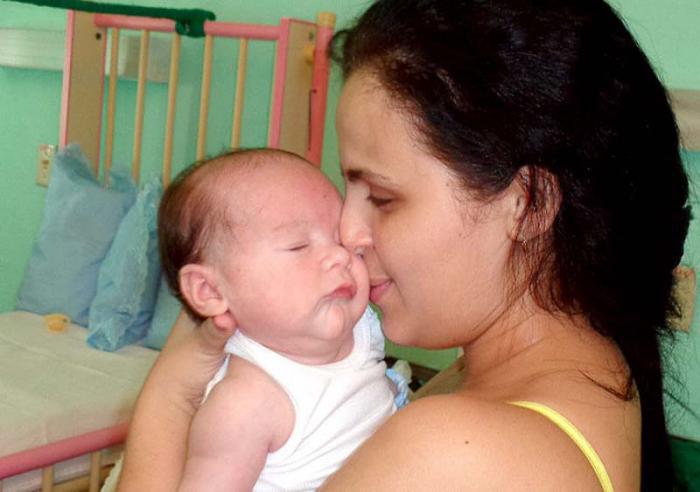Pinar del Rio.— Half a century after a group of doctors suggested for the first time, that mothers be able to accompany their children during their admittance to hospital, the idea seems like the most normal thing in the world.

In Pinar del Río, in one of the Pepe Portilla Paediatric Hospital’s wards, sitting on the edge of the bed where her son - barley two months old - Sebastián Omar lies, Anelis, his mother, says that she couldn’t imagine it being any other way, and warns “If they told me I couldn’t be here with him, I don’t think I would leave him.”
But what today might seem like an ill-advised policy, cruel even, was for a long time common practice in hospitals across the entire country.
85 year old Dr. Gerardo René Hernández, recalls that when he started out in paediatrics, 60 years ago, children were admitted without their parents.
“Imagine, a little three, four, five year old, alone, surrounded by strangers, with syringes…I always thought about what it was like for them to fight an illnesses, even die, without having their mother at their side.”
The situation troubled him for a long time, until in 1965, during a medical congress, together with other doctors, René presented the Mother Companion proposal.
He notes that however logical the idea seems today, there were people who opposed it.
“On the one hand they claimed that relations could transmit infections. In addition, there was the problem of insufficient bathrooms, or space for so many people; this, not to mention the cost of other necessary resources, for example, food.”
At that time in Pinar del Río, such as across the entire country, despite the transformations which were beginning to be realized within the sphere of public healthcare, parents were still obliged to leave their children at the paediatric centre and wait for news at the other hospital nearby.
That place, where dozens of worried families waited for information about their children, became known as the “wailing wall.”
“They were allowed to visit for one hour, three or four times a week, and you can imagine what happened when they left. The children cried until the lights were turned out at 10pm,” explains René.
This is why during that congress we defended the proposal to allow mothers to accompany their children.
”After noting all the advantages what this could bring from a therapeutic point of view, I ended by putting a question to all those present: Which of you doesn’t stay by their child’s side when they are sick?”
Although there were people who still had reservations, the initiative was approved and little by little began to be implemented. “It is true that permitting companions meant double the number of people. The Revolution had to make a great effort to double all resources.”
So, new bathrooms were built, seating was found and mothers were even allowed to accompany their child to therapy.
50 years later, Dr. Gerardo René believes that the establishment of the Mother Companion initiative represents one of the many achievements of the Cuban medical system, without which it would have been practically impossible to reach the low rate of infant morality the country has achieved to date.
“I have had the opportunity to work in other places around the world, and I assure you that it is painful to see children alone, suffering from an illness and to see the parents watching them through a window, unable to be at their side,” agrees Raúl Daniel Lagar, director of Pinar del Río’s Pepe Portilla Paediatric Hospital.
”In addition, it is very important for the treatment process that the mothers be at their child’s side, so that the child feels more comfortable in a hostile environment, where they being injected or undergoing constant examinations.”
“Those of us who never experienced the past era, think that a hospital where children are unaccompanied would be crazy,” adds Dr. José Antonio Viñas head of the hospital’s teaching department, stating that it is very likely that given such a situation, many children were unable to be saved.
With more than 35 years paediatric experience, Viñas assures that for those who dedicate themselves to the profession, “all the mothers’ observations are extremely important. ‘They don’t look right, I don’t like it, they have a recurring fever, their diarrhoea has gotten worse,’ are some vital pieces of information.”
“On the other hand, scientific studies show that having a relation nearby, responsible for providing emotional support, contributes to the patients recovery.”
At barley eight months old, Yadira Álvarez was one of those children who had to be admitted to hospital without a companion. “I remember that my parents would talk about it with a lot of sadness. They said that they could only see me through a glass window, and that it was very hard because I was so small and spent most of the time crying, not allowing anyone to get close to me.”
Yadira, on the other hand, was able to stay with her oldest daughter on the one occasion when she was admitted to hospital for an asthma attack. “It wasn’t for long, but I never left her side, always watching the regulator, her antibiotics and fussing over her more than ever. Sincerely, I can’t imagine a mother begin away from their child in a situation like that.”
Although it might seem unbelievable, Dr. José Antonio Viñas states that there are still countries today where family members are not permitted to accompany the child.
”Here we have had children who have been admitted to those places. The mothers have come and asked when they can visit their child, and on telling them that they can stay for as long as they like, you notice a change and how their eyes light up given such a just and compassionate opportunity.”















